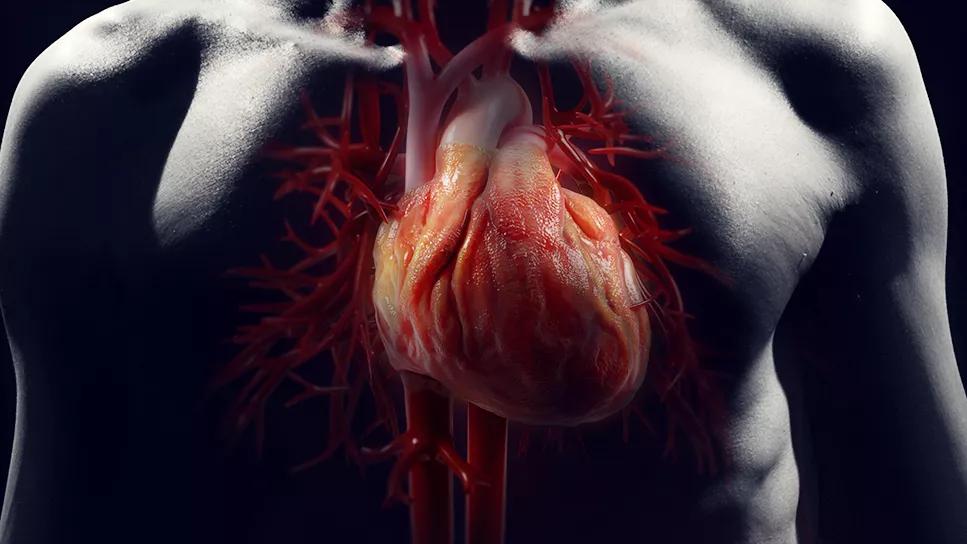Cleveland Clinic study finds large surge in cases vs. historical levels

The incidence of stress cardiomyopathy was significantly elevated in patients presenting with acute coronary syndrome (ACS) during the first two months of the COVID-19 pandemic, rising from historical rates of 1.5% to 1.8% of cases to an incidence of 7.8%.
Advertisement
Cleveland Clinic is a non-profit academic medical center. Advertising on our site helps support our mission. We do not endorse non-Cleveland Clinic products or services. Policy
So finds the first reported systematic study of the association of stress cardiomyopathy rates with stresses related to the COVID-19 pandemic. It was published July 9 in JAMA Network Open by Cleveland Clinic researchers.
“The pandemic has brought about multiple levels of stress in people’s lives,” says Ankur Kalra, MD, a Cleveland Clinic cardiologist who led the study. “People are worried about themselves or their families becoming ill at the same time they’re dealing with economic and emotional issues, societal problems, and potential loneliness and isolation. These stresses can have physical effects on the heart, as reflected by the increasing diagnoses of stress cardiomyopathy we are seeing.”
The retrospective cohort study examined the incidence of stress cardiomyopathy (Takotsubo syndrome) among patients presenting with apparent ACS who underwent coronary arteriography at two hospitals in the Cleveland Clinic health system, both in Northeast Ohio.
Using electronic medical record data, researchers compared 258 patients presenting early in the COVID-19 pandemic, from March 1 to April 30, 2020, with historical controls from four pre-pandemic periods:
The main outcome measure was incidence of stress cardiomyopathy, which was diagnosed according to the international Takotsubo diagnostic criteria. Also assessed were hospital length of stay, 30-day rehospitalization rate and overall mortality among patients with stress cardiomyopathy. For patients in the COVID-19 period, results of COVID-19 testing (by polymerase chain reaction [PCR] analysis of nasopharyngeal/throat swab samples) were also examined.
Advertisement
Age and sex distributions were similar across the five cohort groups, with a median age of 67 and approximately two-thirds of patients being men. Compared with the other cohorts, patients in the COVID-19 period were more likely to have hypertension and had significantly lower initial and peak troponin levels.
The incidence of stress cardiomyopathy among ACS patients was 7.8% in the COVID-19 period, which was significantly higher than in each of the historical periods, when incidences ranged from 1.5% to 1.8%. The rate ratio comparing the COVID-19 period with the combined historical periods was 4.58 (95% CI, 4.11-5.11; P < 0.001). After regression analysis adjusting for confounders, rate ratios remained similar in magnitude.
Among those patients who had stress cardiomyopathy, median hospital length of stay was higher during the COVID-19 period than in the prepandemic periods (8 days vs. 4-5 days; P = 0.006), but there were no significant differences in mortality or rates of 30-day rehospitalization.
Notably, all PCR tests from patients during the pandemic period were negative for COVID-19, and no patients with stress cardiomyopathy reported symptoms associated with COVID-19.
The latter finding suggests that psychological, social and economic distress associated with the pandemic — as opposed to direct viral involvement or sequelae of the infection — is most likely to explain the increase stress cardiomyopathy cases in the wake of the pandemic, the researchers noted.
“Nevertheless,” says Dr. Kalra, “there could be an association of COVID-19 with stress cardiomyopathy, as the mechanism behind this type of myocardial injury in patients with COVID-19 infection remains to be elucidated.”
Advertisement
He and his co-investigators call for further research on the relation between COVID-19 and stress cardiomyopathy incidence, particularly to explore potential differences by region or time of year, in view of their study’s limited geographic reach.
At the same time, the findings argue for increased vigilance for stress cardiomyopathy as long as the pandemic persists, as well as increased self-care for patients with or at risk for heart disease. “It’s important for individuals who feel overwhelmed by stress to reach out to their healthcare providers,” notes the study’s senior author, Grant Reed, MD, MSc, Director of Cleveland Clinic’s STEMI Program. “Exercise, meditation and connecting with family and friends, while maintaining physical distance and safety measures, can also help relieve anxiety.”
Advertisement
Advertisement

Swift, aggressive thiamin therapy may be key to preventing long-term neurological injury

Case underscores potential dangers of combining psychedelics with tranylcypromine and stimulant medications

Researchers explore how changes in the gut microbiome influence the brain's reward response to alcohol

Researchers explore new avenues for the management of psychiatric illness in patients with seizure disorders

Addiction experts use decades of research and clinical experience to help patients overcome substance use disorders

Specialized course helps APPs navigate clinical concerns and interpersonal skills

Comprehensive mental health screening may help prevent postsurgical risks

The reassuring potential of psychedelics for the management of substance use and treatment-resistant mental health disorders